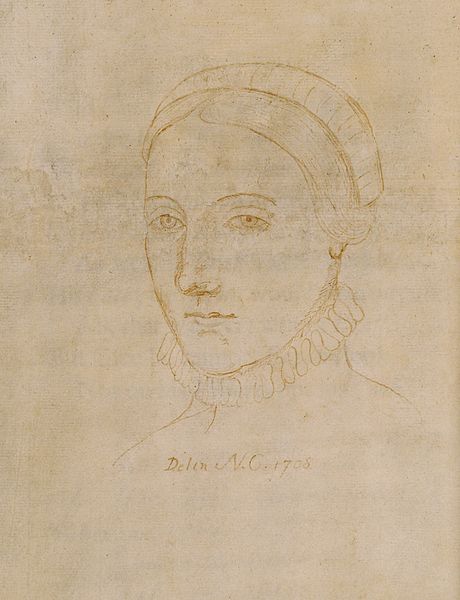“Shakespear’s Consort” depicts what Anne Hathaway may have looked like, drawn by Sir Nathaniel Curzon in 1708, and appears on the verso of the original title page in the Third Folio (1663) of Shakespeare’s works.
Shakespeare’s Wife isn’t amazing just because it’s true or easy to read or riveting, though it is all of those. Fabulously well-researched and armed with the power to doubt, Germaine Greer sets out with one arched eyebrow to question everything that has previously been surmised about Shakespeare’s marriage.
The fact is that we have no idea what Shakespeare’s private life was like, what he thought of his wife, how much of his work was imaginative fiction, how much was based on the truth and how much of it was obsequious nonsense, written only to maintain patronages. But where prior Shakespeare scholars assume a poem or letter’s meaning to be one thing, Germaine Greer assumes it means another. She states that because we really know nothing, prior Shakespeare scholars could be wrong, and she also openly acknowledges that because we really don’t know anything, everything she posits could be wrong, too.
Shakespeare scholars have spent centuries arguing that Anne Hathaway, being 8 years older than dear Will, ensnared him by forcing her wild libido upon him and getting pregnant, thereby forcing him to marry her. However, Greer pores over birth registers from the 1500’s and finds that illegitimate birth was ridiculously common, and plenty of “good women” ended up having bastard children. In fact, leaving Anne to maintain herself and her baby wouldn’t have been impossible. Greer follows every assumption made by “Bardolaters” about Anne in this way. They claim she was useless; Greer finds evidence that many of Anne’s contemporaries could make malt, sew, knit, milk ewes, make cheese, ale, bread, cream, bacon, cloth, woven goods, and that many of Anne’s friends and neighbours were even money-lenders, making 10 per cent annually on their investments. Greer recognises that Anne’s neighbours’ success doesn’t mean Anne had the same success. But it doesn’t mean she didn’t, either. There’s just not much evidence either way. Shakespeare’s Wife occasionally shows that more evidence exists to imagine Anne was independent (or helpful, or literate…) than not, but it also shows that there is not any definite conclusive evidence.
In a way, prior Shakespeare scholars have imagined their hero to have been a genius boy, tormented by a cruel old wife, driven to prostitutes by a cold ugly wife; they have imagined Anne to be a conniving woman who, once she’d had her way with dear Will (enough to have twins and another child with him), ended up leading a miserable solitary life. They imagine her entire life after Will was spent in dire poverty, illiterate, unable even to make any sort of use of herself, unaware and unimpressed by her husband’s work. They often aim to prove Will’s poor behaviour toward his wife is justified by her inelegance, her ugliness, and her general repugnance. Greer proves this story of Anne’s life to be pure imagination. And then imagines something else entirely.
She essentially un-interprets the documents that previous scholars have interpreted to Anne’s detriment. Shakespeare’s will has been interpreted to mean that Will intentionally left Anne from his will because he hated her. Greer argues that there are a large number of possessions that aren’t mentioned in Will’s will, because many things already given would not need mentioning. Importantly missing: his papers. He does bequeath her the bed, and scholars have often said this is a scathing, mean-spirited comment on Anne’s infidelity. Greer shows that beds were often bequeathed back then, because they were the most expensive piece of furniture in the house. Also, beds often couldn’t be moved, so bequeathing a bed also usually meant the beneficiary couldn’t be kicked out of their house. None of this proves Shakespeare did like his wife. It only proves that he might have.
In this way, through careful research and painstaking reinterpretation, Greer imagines for Anne a better life, a life of solid caring and simple honest living. At the end of the book, Greer states her entire book is “probably neither truer nor less true than the accepted prejudice.” After all, we don’t have proof either way, and this is why the limited information offered to history is infuriating. But she’s offered Anne a marriage more like the ones her husband famously wrote about; a marriage where the wife is true to her husband and duties, even if the husband doesn’t behave nearly so well.
What I found really brilliant about this analysis was how Greer clarifies the role that wives of public men are written into by “experts.” She examines how the wives of men who are successful and well-liked are often painted as conniving and unloving. Think Hilary. The wives of the men we admire can never be worth sharing their beds. When Bill was in office, Hilary was painted as a careering woman; their marriage is regularly presented as the picture of marital strife. But she stayed with him and stood by him through an impeachment over an incident wherein Bill humiliated and betrayed her. The judgment of her behaviour as the wife of a powerful man plainly shows how successful men are simply held to a different and lower standard.
Shakespeare’s Wife, by Germaine Greer
First published 2007

